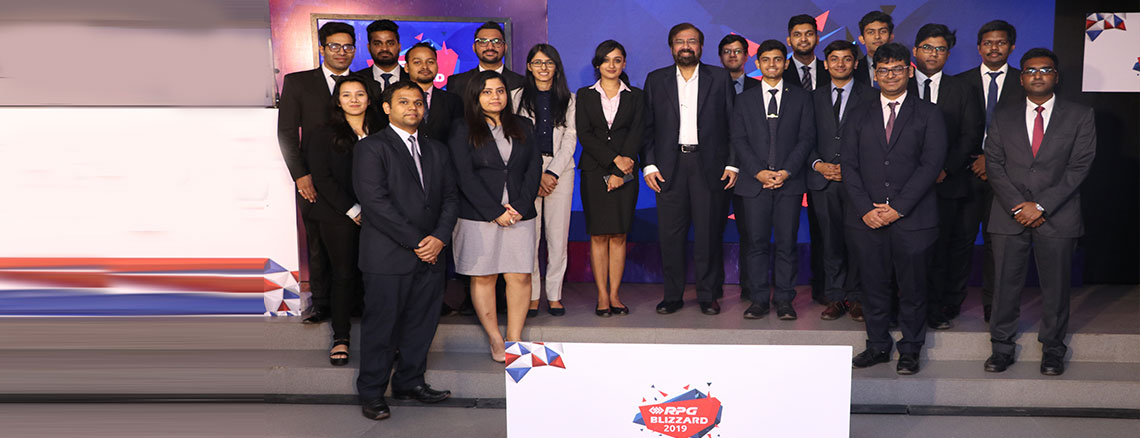“Train people well enough so they can leave. Treat them well enough so they don’t want to,” Sir Richard Branson had once said.
This famous quote by the British business magnate, investor, author, and founder of the Virgin Group sent ripples in HR departments worldwide, reinvigorating the aim to cultivate a better company culture and working environment for employees.
However, as RPG has more than proven, in the world of talent mining, it takes a lot more than work culture and onboarding to provide a good first-impression to a new or potential employee, and in cultivating their engagement with their work.
While taking heed of obvious legitimate criteria, it is equally imperative for organisations to constantly rethink current strategies and innovate new ways to attract (and retain) – both passive and active candidates. The process of attracting talent extends beyond the interview itself. It’s essential to give candidates a positive view of the workplace environment, well before the commencement of processes, including hiring and onboarding.
One of the hallmarks of RPG’s hiring practices is a steadfast focus on painting an evidence-based portrait of the organisation – a free and an honestly assessed picture of what the Group is really like, yielding a clearer idea of whether that person and the company are truly a match made in heaven.
While having the right company culture can make all the difference when it comes to making a position more marketable for potential employees, it is important to note that the portrayal lives up to it. To attract the best talent in the market, a company’s HR needs to focus on creating a reputation in top-tier B-schools as an organisation where candidates would want to work. Vinayak Talwar, Campus Lead at the RPG Group and alumnus of XLRI, shares the story of RPG’s hiring practices from the perspectives of the Employer Branding, Learning & Development, and Talent Acquisition domains.
Partnering with B-schools has now proven to be a great way to demonstrate the RPG core values, and dramatically improve outreach. Advertising the aspects that set RPG apart, allows potential talent to discover information they may not feel comfortable in asking during an interview.
“Campus is one platform where you have limited time to create an impact and hence what is the most critical aspect of this role is to ensure you are providing them with answers to their questions even without having them to ask,” says Vinayak.
The seeds to cultivating and taking this project to the next level were planted three years ago. When RPG was pondering on how to attract top talent, so were a hundred other recruiting companies. The first trophy, at this point, was winning the mind-space of students in India’s top-tier B-schools through the then primary modes of engagement – via pre-placement talks usually held at the tail-end of a working day, or through activities like case study competitions.
What almost always followed was an open-eyed snooze-fest – a minefield that was serially blowing up people’s cognitive capacity. Even elaborate, top-of-the-line corporate presentations were no longer cutting it. The sheer fatigue of getting by a regular, highly erratic day in a competitive B-school was turning out to be a drag on RPG’s larger agenda to reach a specific target audience – talent that is looking to work and grow in a people-first, happiness-driven, innovation-oriented culture.
“It was then that we decided to reinvent the way we engaged with students on campuses. We wanted to create opportunities for more meaningful conversations with these students, and not just to position RPG as a great employer,” explains Vinayak.
“We sought to provide students with the information and skills they would need, and acquaint them with the corporate world that they’d soon step into. Clearly, this required us to change the way the game was being played. We decided we wouldn’t run the usual race anymore; instead we would do well by ‘doing good’.”
The Happiness Carnival: A memoir of happy hours on campus
For RPG’s HR team, fashioning the RPG Happiness Carnival proved to be a watershed moment for the organisation’s growth. By Day One of their first Happiness Carnival, they had successfully created a milieu of entertainment where the students would experience a platform to engage and participate in a completely unconventional manner, followed by an enthralling evening with a band performance, a rather uncommon feature in the pre-placement talk (PPT) system.
While the razzle-dazzle of a carnival would help demonstrate a youth-oriented ‘awesomeness’ in RPG’s culture, it was equally vital to ensure that the campus engagement programme also appealed to students’ intelligence and curiosity about the Group. For this, the RPG Happiness Carnival also held free-flowing interactions and learning sessions to ensure students had an enriching overall experience. Participation exceeded expectations, and the campus was abuzz with RPG's unique culture.
Blizzard, the case-study competition, proved to be no different either. At any given time in a premier business school, it can be safe to assume the presence of countless case-studies with little to no variety. Therefore, the status-quo of the traditional format had to be challenged – it had to undergo an optical makeover whilst keeping the core identity of the project largely unaffected. A thematic approach was employed, where the participants partook in highly unconventional finales, with the design concepts including Game of Thrones, The Marvel Universe, etc.
Leveraging COVID-19: Pushing the boundaries into a thoughtful redesign
2020 cast a dampener on RPG’s yearly grand plans that enabled talent to experience RPG up close and personal. As the world grappled with the gravity of the deadly virus, so did RPG.
However, a silver lining had been unintentionally cast in 2019 itself – its flagship initiative had already been successfully conducted virtually. And COVID-19, by requisitioning a virtual ecosystem, simply empowered the group to build and innovate on the same premise, revamping the highly engaging, thematic approach of Blizzard to fit the new-normal world.
As RPG hosted six case studies on its digital platform, a very fitting themed finale adopted the look of the hit TV series, The Office. This was just the start of RPG’s newest edition of its hiring playbook.
According to Vinayak, “Most B-school students dream of bagging the perfect internship. Anxiety, the common thread that stitches all of them together, peaks during this time as their hunt for a seamless industry experience intensifies. Participating in the summer internship programmes of top-tier schools became imperative for one reason – they needed to experience RPG from the eyes and ears of people they knew, and could trust.”
Thus arose Experience RPG, a programme designed for campus alums who are currently employed by RPG, to address their B-school progenies. There’s a lot riding on these first-time interactions, turning it into a moment of truth for the organisation. The way their experiences will be conveyed will define or redefine how the new potential hires perceive RPG and decide their next steps, going forward.
Detailed insights into the workplace culture, along with candid Q&A sessions, went from physical to digital. A few perks that the digital platform threw in, included interactions with the alums based in the US, the UK, and South Africa. Additionally, letting the international alums lend a hand enhanced their own experience too – they felt immense pride in contributing.
Furthermore, not only did RPG manage to narrate anecdotes of meaningful roles and job satisfaction stories, but also left an impact on the students. They were now pulled into thinking about joining the RPG family rather than pushed, and were waiting for RPG to pop the question.
Talking about the roadmap ahead, Vinayak shares, “Going ahead, a similar initiative called the Campus Mentor Programme is slated to be launched, wherein students can ask for and obtain insights from senior leaders in the organisation, through a social media interface.”
Another striking win for RPG was established by uniting with external partners to engage with over 7,500 students who were yet to join their campuses but were already eager to know more about the companies they could aspire for.
The virtual platform – IGNITE – served as a platform for Milind Apte, CHRO, CEAT, to present his views alongside panelists from numerous general management programmes. To supplement the initiative, a contest was launched online – the #RPGIgniteHappiness Challenge – where happiness stories were shared by students on their respective social media handles. This event brought RPG’s leading people practices to fore, even bagging a Forbes magazine feature.
Happiness – Doing well by doing good
Indeed, many organisations screen job candidates for empathy, attention to detail, and a service-mindedness approach. But how many organisations can give the same back? Simply the knowledge that the workplace culture strives to deliver the same can make a profound difference, increasing confidence, satisfaction and long-term loyalty.
As the HR team continues to reinvent the way it engages with campuses by generating opportunities for meaningful, two-way conversations, instead of just promoting the RPG employer brand, it also supports candidates by providing the information and skills essential to survive anywhere in the corporate world, and not just at RPG.







